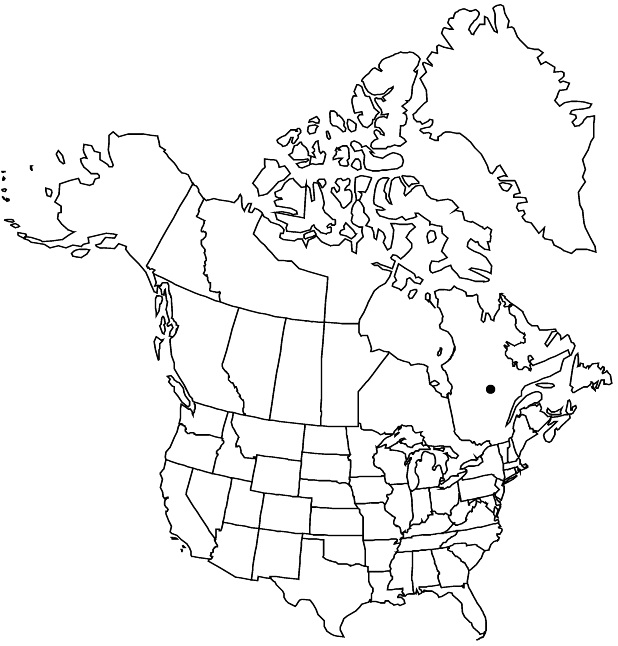Micranthes gaspensis
in N. L. Britton et al., N. Amer. Fl. 22: 552. 1918 ,.
Plants solitary or tufted, from caudex. Leaves basal; petiole flattened, 0.7–2.5 cm; blade obtrullate or obovate to ovate, 0.8–2.5 cm, ± coriaceous, base attenuate to ± cuneate, margins serrate to dentate on distal 2/3, ciliate, surfaces tangled, reddish brown-hairy abaxially, glabrous or glabrate adaxially. Inflorescences 3–10-flowered, subcapitate to spicate cymes or thyrses, 2–10(–15) cm, glabrate to sparsely hairy proximally, ± densely purple-tipped stipitate-glandular distally. Flowers: sepals erect, reflexed in fruit, triangular to deltate; petals white, not spotted, obovate, clawed, 1.5–2 mm, ± equaling sepals; filaments linear, flattened; pistils connate to 1/2 their lengths; ovary 1/2 inferior, appearing more superior in fruit. Capsules green, becoming reddish or purplish, folliclelike. 2n = 40.
Phenology: Flowering summer.
Habitat: North- or west-facing, abrupt schist slopes, cliff bases, mossy or muddy areas, streamsides, seepages, cool ravines or chimneys
Elevation: 800-1100 m
Discussion
Of conservation concern.
Micranthes gaspensis appears to be the stabilized hybrid derivative of M. nivalis and M. tenuis (C. Gervais et al. 1995), known only from the Shickshock Mountains of the Gaspé Peninsula; the chromosome number is intermediate between that of the parents (2n = 60 and 20, respectively), and seeds are fertile. Neither parent occurs any longer in the Gaspé Peninsula, and the plants appear to self-perpetuate.
F1 hybrids of the two parent species (also 2n = 40) occur in Yukon (D. L. Krause and K. I. Beamish 1973) and possibly at other locations throughout their range of sympatry, such as northern Quebec and Labrador; such hybrids will key out with Micranthes gaspensis. Individuals called Saxifraga rufopilosa (Hultén) A. E. Porsild [S. nivalis (Linnaeus) Small var. rufopilosa Hultén] from Yukon and Alaska (W. J. Cody 2000) also will key out here. These may represent either the F1 hybrids mentioned above or stabilized hybrid populations such as those in the Gaspé. It is possible that such stabilized populations would fit under the name M. gaspensis. A systematic study is needed before a taxonomic conclusion can be reached concerning their status.
Selected References
None.
